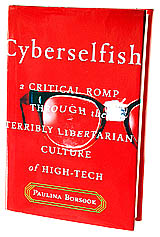June 22, 2000
Accusing Silicon Valley of a Heart of Coal
By LISA GUERNSEY
| |
|

|
CYBERSELFISH: A CRITICAL ROMP THROUGH THE TERRIBLY
LIBERTARIAN CULTURE OF HIGH-TECH
By Paulina Borsook
(Public Affairs, $24.)
|
 aulina
Borsook is fed up with Silicon Valley. But the area's
instant millionaires and outrageously priced houses are not
the reason for her fuming. It is the ideology behind the
technology industry that really has her miffed. aulina
Borsook is fed up with Silicon Valley. But the area's
instant millionaires and outrageously priced houses are not
the reason for her fuming. It is the ideology behind the
technology industry that really has her miffed.
Those emotions come screeching through in Ms. Borsook's
book, "Cyberselfish: A Critical Romp Through the
Terribly Libertarian Culture of High-Tech."
Ms. Borsook, a journalist and former contributing writer
for Wired magazine, has written an irreverent (and sometimes
incomprehensible) rant on what she sees as the hypocrisy of
today's technology leaders. They don't like big government,
they don't like regulation, and they wish that Uncle Sam
would just leave them and their market-driven economy alone.
Yet, as Ms. Borsook points out over and over again,
government money and federal regulations have made Silicon
Valley what it is today. Federal grants sponsored university
research that has been translated into scores of Internet
and computer products. Regulations have ensured that the
banking system is "relatively fraud free." And the
defense industry, don't forget, brought the Internet into
existence in the first place.
"Government," she writes, "has made
Silicon Valley a fine and dandy, safe and regularized place
to make scads of money." Internet moguls who do not
realize this, Ms. Borsook writes, are nothing better than
"privileged spoiled teenagers." To those who are
tired of the hype emanating from Northern California in the
past five years, the Bay Area bashing in "Cyberselfish"
may be a welcome relief.
The book also presents an insider's view of how high-tech
culture has evolved in the past decade. Ms. Borsook, who
lives in Santa Cruz, has been observing and interacting for
years with the area's computer programmers, software
engineers, cryptographers and venture capitalists.
One chapter focuses on Wired and the personalities that
gave the magazine its libertarian bent. The chapter also
reveals some of the frustration felt by women who wrote for
Wired in the mid 1990's, women who bemoaned how a magazine
that considered itself in the vanguard could in fact be
nothing more than a geek's twist on the old boy network.
But if you plan to accompany Ms. Borsook on this 256-page
romp, be prepared to take a deep breath. Reading the book is
like charging blindly through an obstacle course. Paragraphs
are filled with so many asides, hyphenated words,
parenthetical clauses, dashes and asterisks that you are
left virtually panting at the end of each sentence. That is,
if you get to the end of the sentences at all.
Here, for example, is Ms. Borsook's argument against a
free-market society in which feeble people are pushed aside
without any consideration of their potential as creative
human beings:
"The hypersensitive maladaptive
no-commercial-potential individuals, the runts of the
litter, and the defective members of the species can --
because as humans and not planaria we can value things not
just of momentary food/shelter/mate-status-enhancing
enticement -- create the best of what makes us remotely
human."
Have you given up yet?
Her arguments, too, require some patience. The apparent
selfishness of the technology community is at the heart of
the book, so Ms. Borsook tries to paint a picture of dot-com
billionaires keeping all their money to themselves. Yet in
reviewing data on philanthropy in Silicon Valley, she leaves
questions dangling and relies on what seems to be
less-than-rigorous research.
For example, she writes that in the mid-1990's, the
percentage of corporate profits devoted to corporate
philanthropy in Silicon Valley dropped. But she quotes
statistics collected in 1997 and earlier. What has happened
in the past three years, when many companies became even
more flush? If recent statistics were not available, surely
an analysis of companies' annual reports could have helped
fill in the blanks.
The drop also raises questions.
Ms. Borsook writes that 1.14 percent of profits in 1993,
and 0.92 percent in 1997, were used for philanthropy. That
does not sound like a steep decline, but there is no way to
imagine otherwise because readers are given no points of
comparison in other industries.
It turns out, in fact, that corporate contributions, as a
share of earnings, have been declining for a few decades
among United States companies. Data from The Conference
Board, a nonprofit research group, shows that the numbers
dropped from 2.36 percent in 1986, the highest percentage in
the past 50 years, to 1.1 percent in 1997. So, yes, Silicon
Valley companies look slightly stingier, but the drop may be
the result of larger national trends not related to
libertarianism, like the research group's finding that
companies are starting to give more non-cash gifts.
Ms. Borsook makes other arguments that sound more solid.
The software industry, she writes, often congratulates
itself for donating thousands of packages of software to
schools and nonprofit groups. Yet the donations are often no
more than marketing drives that come with a bonus: they
provide companies with useful tax deductions.
Beyond the impossible sentences and undeveloped
arguments, the book does raise broader questions that are
worth asking about the libertarianism of the high-tech
industry. If the ideology behind American corporations
becomes more and more libertarian, if voters agree that
Internet companies should be left alone and then decide to
apply that concept to other corporate interests, what does
that mean for the social institutions that make up our
communities? Will people turn further and further away from
schools, from hospitals, from less-than-computer-literate
people who need a hand?
Ms. Borsook does not have the answers. But at least she
raises the questions. "We can only marvel," she
writes, "and be afraid."
|